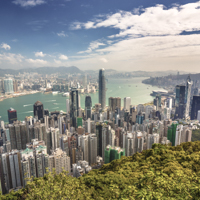
There are certainly some similarities to the environment seen in 1997:
- The Hong Kong property market has seen steep price appreciation in the last several years – with prices rising an average of 60% in the last 5 years
- Hong Kong remains a key financial center for Asia, just as it was in 1997.
- Looking at it another way, Hong Kong’s economy and consumer sentiment depend on the health of the Asian and Global financial markets. This means Hong Kong is still subject to the exogenous risks and developments around the world. Another black swan event would significantly impact this market.
- Hong Kong remains pegged to the US Dollar and, by implication, its interest rates. If US interests rates rise, this will impact the Hong Kong property market.
- Finally, property continues to be a major driver of our economy and a significant portion of assets/wealth, as it was in 1997.
These were all the case back in 1997 and were among the reasons why Hong Kong’s economy and real estate market experienced such a steep decline when the Thai Baht triggered the Asian financial crisis. However, while these important similarities exist, there are fundamental differences.
5 Critical Differences Between 1997 and 2017
1.Buying has not reached frenzied levels

Although there has been an increase (very recently) in buying activity at 5,070 transactions/month in 2017* and 7,060 transactions in April, market activity remains close to historical averages
15-year average (2002-2016) = 7,180 transactions/month
10-year average (2007-2016) = 7,150 transactions/month
These are not signs of a buying frenzy which, in turn, typically signals a bubble (and pre-empts a crash)
2. Interest rates are far from risky levels

Hong Kong, like much of the world, is in a very low interest rate environment. Hong Kong interest rates are approximately 3% (even lower than the 4-5% in most global economies). Going into the crash of 1997, interest rates were over 9%.
People generally associate rising interest rates with declining real estate prices, which makes sense – the more expensive it is to borrow, the harder it is to purchase a property or pay an existing mortgage. However, it is easy to forget that during the first stage of a cyclical upturn in interest rates, interest rates rise because an economy is growing. Major real estate bubbles typically occur once interest rates reach much (much) higher levels than where we are now – perhaps 7% or higher. The upcoming increase in interest rates will be driven by a strengthening US/global economy, which also should support property prices.
It should also be noted that interest rates are largely predicted to increase very slowly. It will take years to reach danger levels as it relates to the property market, and Hong Kong’s interest rates may be dampened by independent actions of Hong Kong and Chinese banks as mentioned in our article summarizing predictions for the second half of 2017.
3. Affordability – a tale of two cities

Affordability in real estate is often measured similar to a revenue multiple in stocks - by taking the median house price and dividing it by the median annual income level. This is the statistic reported by the Hong Kong Monetary Authority, among others. Hong Kong is among the world’s least affordable cities by this index, with the average property requiring around 19 years of average income. The HKMA showed this ratio to be 10x in 1997, so by comparison, Hong Kong is much less affordable now to the average citizen.
However, this measure only considers annual income, not total wealth. Hong Kong’s low tax regime (15% income tax and no taxes on dividends or capital gains) means people keep a far greater proportion of their pre-tax income than in other economies. As a result, there is enormous wealth in Hong Kong.
All things being equal, the rise in the affordability index would still seem alarming since Hong Kong’s tax policy was the same 20 years ago.
However, all things are not equal. The Hong Kong government has implemented 8 cooling measures over the last 7 years across stamp duties and borrowing restrictions. This has led people who would have otherwise purchased homes to hold back – and accumulate wealth instead. Thus, there is enormous pent-up demand because of the cooling measures that didn’t exist in 1997.
Knight Frank’s Global Wealth Report 2017 shows Hong Kong’s ultra-high-net-worth have grown their wealth by 50% since 2006. The same report states that the number of millionaires has increased by 49% over the same period.
So affordability, more broadly defined, is higher than the HKMA’s index suggests, offsetting related concerns that affordability indicates a property bubble.
4. Excess debt

Housing crashes are almost always caused by overleveraging – people borrowing more than they could afford to support when buying a property. The HKMA reported that Hong Kong’s average loan-to-value ratio is 51%, lower than the 64% before the cooling measures were introduced, and similar to the LTV in 1997 of 52%. But one should remember that excess debt is not what triggered the 1997 crash – that was a crisis of confidence in the broad financial markets. Other global markets typically operate at LTV ratios of 70% or more, and may approach 100% before a housing crash (which sends LTV values well above 100%.) Hong Kong remains conservatively leveraged on this measure.
And delinquencies on residential mortgage loans remain below 0.05% (0.1% in 1997) - another indication that excess debt did not cause the 1997 crash, and is not a leading concern now.
5. China – The elephant in the property market

China is perhaps the most important difference between 1997 and 2017. At the time of the handover, China’s economy was just starting its meteoric rise with a GDP of just under US$1 trillion today. Over the next 20 years it would grow to over US$11 trillion. Anyone in Hong Kong will tell you how the rise in China has affected Hong Kong since the handover. And China’s economy has a long way to continue growing, even at the “low” GDP growth of 6.7% seen in 2016.
As China’s middle-class and wealthy populations wealth has grown, so has their sophistication levels and desire to diversify their investments. Hong Kong is a natural beneficiary of this, and real estate specifically has always been one of the preferred ways to invest.
Despite cooling measures in Hong Kong and capital flow restrictions in China, this trend is almost certainly going to continue, and is likely to increase over time as Chinese companies (especially banks) expand directly into Hong Kong as they are doing now. HKMA’s recent statistics showing that only 5% of Hong Kong home purchases are by non-HK residents or companies highlights that the mainland Chinese investor is still a relatively small part of Hong Kong’s real estate ownership. Sure, there is likely a shadow market for Chinese investment that is difficult to quantify, but there remains tremendous room for mainland Chinese investors to invest in Hong Kong. This did not exist in 1997, and means that the demand profile for property is much broader than it was then.
Perhaps even more importantly, it’s not only the “speculative” direct investment dollars from China that matter. The investments of Chinese businesses into Hong Kong are only now ramping up. As these companies continue to expand into Hong Kong, they will bring capital through jobs, spending and trade. This indirectly supports the real estate market, and is likely to grow.
---
In conclusion, Hong Kong is, on many levels, very different to the Hong Kong of 1997. The comparisons made to the property market crash that occurred 20 years ago are dramatic, but don’t account for the entirely different interest rate environment, current wealth in Hong Kong and the potential investment dollars that are still to come from China.
In many ways, Hong Kong is a safer economy than it was back then, and a “new normal” is the natural result. So “record prices” should not be compared to the highs of 1997 because the environment has changed. Again, just look at stock markets over the last 100 years for lessons in a changing definition of “normal” as technology, productivity and trade have evolved.
Of course, we’re still subject to a major global crisis – a black swan event – but the definition of black swans are that they can’t be predicted. From what we can see today, Hong Kong’s real estate market is a good long-term bet, albeit an increasingly expensive one.




